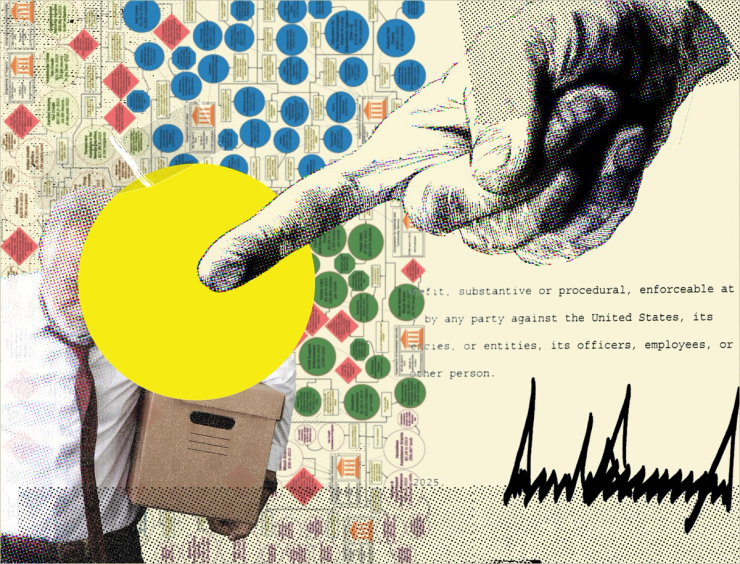The News
Washington View is Ben Smith’s new column, aimed at helping our readers understand the Trump administration as it seeks to remake the US government and American society and reshape everything from private enterprise to global trade.
More than 22,000 federal employees lost their jobs in DC, Maryland, and Virginia from January to May, according to the Richmond Fed. They include members of the top ranks at institutions from the CDC and IRS to the FBI and NSA, pockets of American permanent government that have long weathered changes in presidential administration.
When the CDC head refused to implement changes to vaccine policy and fire subordinates, she lost her job immediately, as did they. When the politician appointed to run the IRS appeared to side with the permanent staff, President Donald Trump literally sent him to Iceland.
Shattering the job security once afforded to the permanent government will have been one of Trump’s signal and lasting achievements, no matter how the rest of his term goes. So I spent some time last week trying to understand how this crusade is seen inside a White House that has gone further, faster, than either friends or enemies expected.
“It’s a directive from one person — the president,” one top official centrally involved in reshaping the government said. “‘Get it done’ is the name of the game.”
Part of the velocity of change comes from a fervor that began last summer: “The attitude stems from the president getting shot at Butler,” said another White House official. “There is no time to waste — by definition, this is a one-term president.”
Elon Musk, for a time, defined this assault and captivated public attention. But the “tip of the spear,” as a top White House ally put it, is deputy chief of staff Stephen Miller, who in February offered one of the most important explanations of this administration’s outlook. Trump, he said, is “removing federal bureaucrats who are defying democracy by failing to implement his lawful orders, which are the will of the whole American people.”
In this article:
Know More
Every head of every government in the world has been frustrated with bureaucrats. The legendary ’80s British satire Yes, Minister captured the dynamic in which powerful civil servants subtly stymie the plans of elected officials while appearing to obsequiously support them. But Trump and his aides have signaled that they view much of what is widely viewed as expertise as useless at best, mere left-wing ideology at worst. And while every modern president has tried to consolidate power in the White House, not every administration would say bluntly that, for instance, “diplomatic experience is fake.” Trump has not shown much concern about the prospect of a US government shutdown at the end of the month.
Still, powerful pockets of the US civil service — from the Pentagon and intelligence services to the agencies responsible for health and safety — do constitute the closest thing the US has to a “deep state.” These are strong institutions with their own internal cultures, values, and loyalties that can often involve resisting political leadership and its mandates — as both Barack Obama and Trump, in his first term, found when they tried to withdraw from Afghanistan.
To their allies, they’re the institutional bulwark of democracy; to Trump, they are the enemies of the democracy that elected him. But “now it’s obvious that if these policies aren’t going to be implemented, you’re just immediately out,” the former Trump aide Steve Bannon told me. “No more ‘yes, Mr. Minister.’”
Ben’s view
The reason Trump has been successful at waging war on civil servants he sees as standing in his way is the same tool he’s used to his own political benefit since 2015: social media. It’s one thing to issue top-down mandates. It’s another to have an army of enforcers with a direct line to the president.
“Honestly, I don’t think it would have been possible pre-social media,” the White House ally mused, citing the MAGA influencer Laura Loomer and any number of lesser-known X accounts. “There are 100 different outlets that can cover your insubordination — and they do.”
Trump’s victories against the bureaucracy have appalled many Democrats, though none have much of a theory on how to put Humpty Dumpty back together. It’s going to be hard to attract the best and the brightest to temporary employment.
But others on the left are ready for the change and believe that the brakes on democracy represented by the bureaucracy — and by the Federal Reserve, most of all — are no longer viable.
After mocking think-tankers for identifying Federal Reserve independence — undemocratic by definition — as vital to “our democracy,” the liberal economist Adam Tooze asked whether it’s “time to actually define what the appeal of ‘our democracy’ actually is” and to “define what a democratic politics of central banking might look like.”
As with many of Trump’s innovations, Democrats are beginning to believe there’s no going back.
Room for Disagreement
The Niskanen Center argued recently that politicizing the bureaucracy will produce such bad outcomes that future presidents will have to reverse course. “Business literature has developed a robust evidence base showing that the ability of employees to speak up without fear of retribution directly contributes to improved team and firm performance” — and inversely, that fear is “significantly” related to worse outcomes.
Notable
- Longtime Trump-orbit figure Corey Lewandowski, now at the Department of Homeland Security, may be the next to go, The Wall Street Journal writes.
- Nine former CDC leaders wrote in The New York Times that the agency’s firings and policy changes under health secretary Robert F. Kennedy Jr. have endangered Americans, who must now “look out for one another.”


